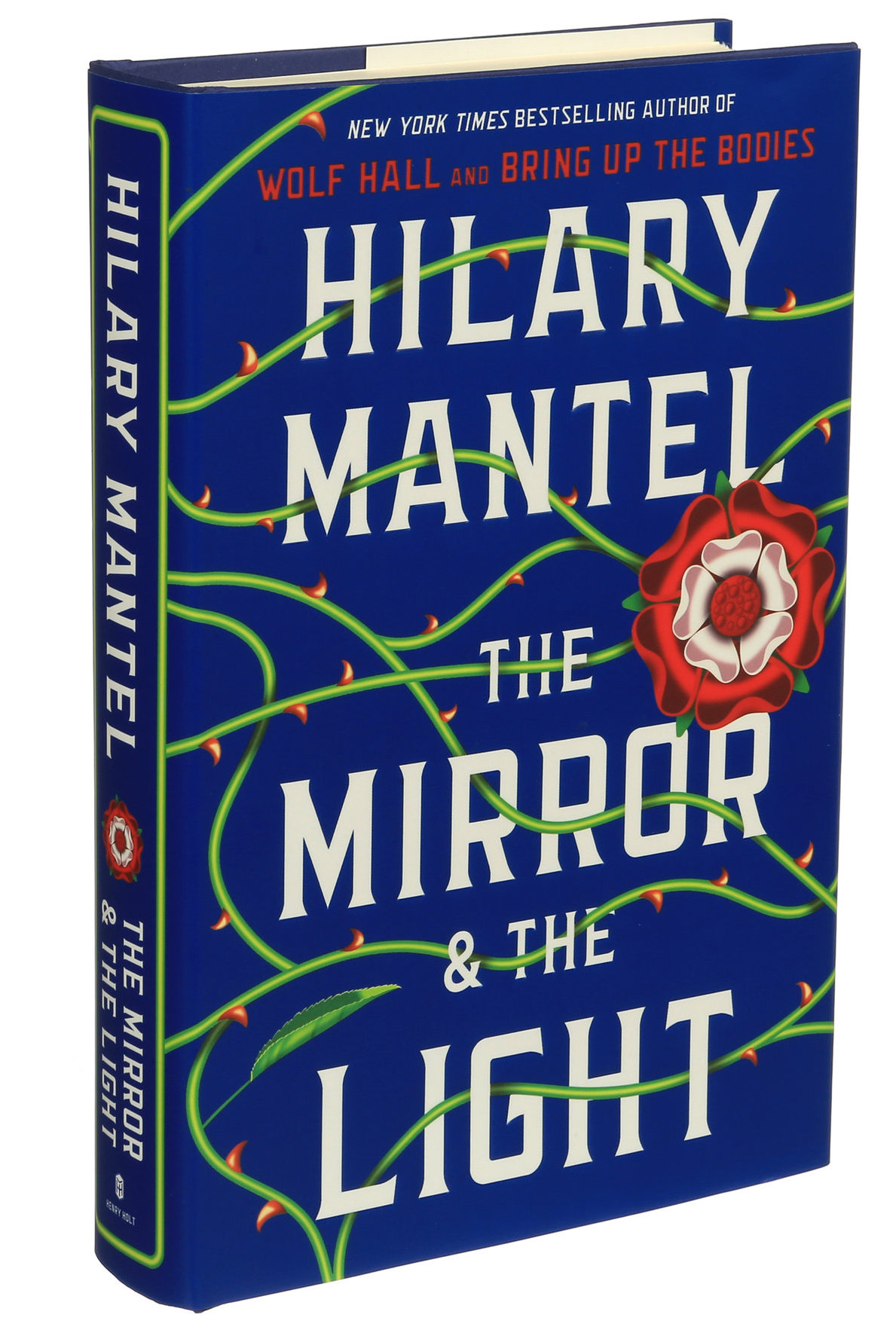The Mirror and the Light is the third and final volume of Hilary Mantel’s monumental Wolf Hall trilogy.[1] Coming in at just shy of 900 pages, it is without exaggeration a genuine ‘page turner,’ and has been engrossing lockdown reading. Part historical novel, part rigorously researched historical biography, Mantel’s work gives a fast-paced account of the political intrigue and power plays that ensued in the time of the English Reformation during the reign of Henry VIII. The Mirror and the Light covers the period 1536-1540 which includes the birth of Edward (who would become the first truly Protestant monarch; King Edward VI), and the martyrdoms of several first generation English reformers including William Tyndale. His crime was to give his King and the English speaking peoples their first Bible translated from the original languages into their mother tongue. Mantel’s Cromwell says of him,
Tyndale knew God’s word and carried a light to guide us through the marsh of interpretation, so we would not be lost as Tyndale himself put it —like a traveler tricked by Robin Goodfellow, and left stripped and shoeless in the wastes.[2]
Mantel retells this period of history through the voice of Thomas Cromwell (1485-1540). The son of a blacksmith, he escaped a violent upbringing; working in turns as an itinerant labourer, a servant in the homes of the wealthy, and a professional soldier in France. Having reinvented himself as a successful lawyer, Cromwell rose to prominence first as the Catholic Archbishop Wolsey’s right-hand man, and then ‘second in charge’ after Henry in the work of separating the English church and state from the ‘Holy Roman Empire.’ Cromwell finally fell out of favor with his sovereign, and was executed by order of the king he had so faithfully served.

The Mirror & the Light
Reformation from Above and Below
As many historians have observed, the church in England was reformed from both ‘above’ and ‘below.’ Reformation from above was achieved through the political struggle of the English nation forging its identity and establishing its sovereignty apart from Rome and Papal control. The original framers of the act of parliament which gave the English sovereign the title ‘head of the church,’ made it abundantly clear that no human ruler could have supreme authority over the church which belonged to Christ. Archbishop Thomas Cranmer explained it thus:
The title ‘supreme head of the Church’ gives the king no new authority: it does not signify that he can assume any spiritual power … This document declares that the words ‘reform abuses and heresies’ indicate the authority which the king possesses to suppress the powers which the Bishop of Rome [Pope] or other bishops have usurped in this realm.[3]
However, there was a prior Reformation from below that was already well under way. For Cambridge scholars such as Bilney, Cranmer, Latimer, Tyndale and Ridley who were hearing the biblical gospel of grace for the first time, what was actually at stake was the supreme authority, not of any human ruler, state or political system, but of Scripture itself. The publication of the Greek New Testament by the humanist scholar Erasmus, its arrival at Cambridge, and the eventual translation of both the Old and New Testaments from the original Bible languages for the first time into English, led to the recovery of genuine Christian faith; and the widespread conversion of church leaders, politicians, and men, women and children from all walks of life throughout the nation.
Mantel depicts Cromwell as a man with genuine faith in Christ, who is convinced of the divine authority and life giving power of the Scriptures.
Throughout his life Henry remained staunchly committed to the religion of medieval Catholicism. He upheld the ‘bloodless sacrifice of the Mass,’ and rejected the biblical teaching that sinners are saved by grace alone, through faith alone, by the merits of the death of Christ alone. He made use of the Reformers as he sought to be divorced from Papal authority, to increase his own wealth and power, and that of the English nation.[4] But, as was the case with four of his six wives, he was quite happy to dispose of them once they had served his purposes. A large number of evangelicals were martyred under Henry.
The Flawed Reformer
Thomas Cromwell is the hero of Mantel’s account, but she has not censored out his moral compromise and conflicted self-interest. As a highly ambitious man, he got his hands dirty in various political intrigues that were involved in serving his king—and was rewarded for it with wealth unheard of for a commoner.
But Mantel also depicts Cromwell as a man with genuine faith in Christ, who is convinced of the divine authority and life giving power of the Scriptures. He is a friend to the theological Reformers, and a true public-servant, who pursues the dream of seeing ‘common people’ made literate—not least so that they can read the Scriptures in their own tongue. Cromwell knows that God alone is the true Sovereign; that his word is his scepter, and that in its pages we hear the gracious and loving voice of our loving heavenly Father.
Real People used by our Kind and Powerful God
One of the most engaging features of Mantel’s book is that the historical characters speak in their own voices, from their own world view, and with the real flaws of their personality and temperament on display. The author has made use of diaries, court documents, letters, sermons, and household inventories that history has handed down to us. The coarse language, toilet humour and profane speech of Tudor England have not been censored. Neither have the historical voices been pushed through the sieve of political correctness in the interests of 21st century ideological commitments. The church before the recovery of the Scriptures is described as one in which there is wide-scale corruption, and filled with all kinds of abuses, which left the English people in the darkness of ignorance, superstition and fear; and the nation a vassal state of a corrupt empire. The authentic voice and beliefs of the Reformers shines through, with their rough edges left intact. An example of this is heard in Cromwell’s dream for England; that exceeds that of Henry or any future monarch or system of government:
Even after Henry dies … our work is safe. After a generation, the name of Pope itself will be blotted out of memory, and no one will ever believe we bowed to stocks of wood and prayed to plaster. The English will see in daylight, not hidden in clouds of incense; they will hear his word from a minister who faces them, instead of turning his back and muttering in a foreign tongue. We will have good-living clergy, who counsel the ignorant and help the unfortunate instead of a scum of half-literate monks squatting in the dust with their cassocks hauled up, playing knucklebones for farthings and trying to see up women’s skirts. We will have an end to images, the simpering virgin saints with their green-sick faces … The faithful will cherish their Saviour in their inner heart, instead of gawping at him painted above their heads, like a swinging sign. We will break the shrines, Hugh Latimer says, and found schools, turn out the monks and buy horn books, alphabet books for little hands. We will draw out the living God from his false depictions. God is not his gown, he is not his coat, he is not shreds of flesh or nails or thorns. He is not trapped in a jeweled monstrance or in a window’s glass. But dwells in the human heart. [5]
The Martyr
This book has grimy edges that encircle passages of beautiful soaring prose. These were hard and brutal days, at a time when England was going through the pains of rebirth. Later generation of the Puritans would strive to continue that labour—giving us the reformed, protestant and evangelical tradition that we inherit today. It was a cause for which many would lay down their lives. Cromwell’s last recorded prayer written in prison on the eve of his execution on July 28th 1540, included these words:
O Lord Jesu … I see and acknowledge that there is in myself no hope of salvation, but all my confidence, hope and trust is in Thy merciful goodness. I have no merits nor good works which I may allege before Thee … Thou gavest Thy most precious body and Thy blood to be shed on the cross for my sake … Let Thy righteousness hide and cover my unrighteousness. Let the merits of Thy blood shed for me be satisfaction for my sins … Grant that the weakness of my flesh not be overcome by the fear of death … and when death has taken away the use of my tongue, yet my heart may cry and say unto Thee; ‘Lord! Into Thy hands I commend my soul; Lord Jesu! Receive my spirit!’ Amen.[6]
And they overcame by the blood of the Lamb, and by the word of their testimony; and they loved not their lives unto death. (Revelation 12:11)
[1] Hilary Mantel, Wolf Hall (2009); Bring up the Bodies (2012); The Mirror & the Light (2020). See also the wonderful BBC series currently available on Netflix, starring Mark Rylance, which covers the stories of Wolf Hall, and Bring Up the Bodies. A sequel covering The Mirror & the Light is also planned.
[2] The Mirror and the Light, 280.
[3] Quoted in J.H. Merle d’Aubigne, The Reformation in England/Volume Two. (Edinburgh; The Banner of Truth Trust, 1963), 207.
[4] J. H. Merle. D’Aubigne, Volume One. 338. ‘The divorce of Henry Tudor and Catherine of Aragorn is a secondary event; but the divorce of England and popedom is a primary event, one of the watersheds of history…The Word of God had spiritually separated England from the Papacy; the “great matter”[Henry’s divorce] separated it materially.’
[5] The Mirror and the Light, 272.
[6] J.H. Merle D’Aubigne, Volume Two. 421-422.















